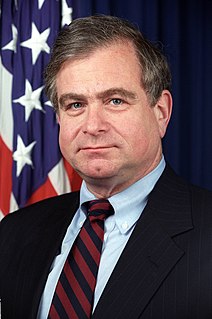A Quote by Dick Cheney
I have argued in the past, and would again, if we had been able to pre-empt the attacks of 9/11 would we have done it? And I think absolutely. We have to be prepared now to take the kind of bold action that's being contemplated with respect to Iraq in order to ensure that we don't get hit with a devastating attack when the terrorists' organization gets married up with a rogue state that's willing to provide it with the kinds of deadly capabilities that Saddam Hussein has developed and used over the years.
Quote Topics
Able
Absolutely
Action
Again
Argued
Attack
Attacks
Be Prepared
Been
Being
Bold
Capabilities
Deadly
Devastating
Developed
Done
Ensure
Get
Gets
Had
Hit
Hussein
In The Past
Iraq
Kind
Kinds
Married
Now
Order
Organization
Over
Past
Prepared
Provide
Respect
Rogue
Saddam
Saddam Hussein
State
Take
Terrorists
Think
Up
Used
Willing
Would
Years
Related Quotes
Because if we make the wrong choice, then the danger is that we'll get hit again, that we'll be hit in a way that will be devastating from the standpoint of the United States, and that we'll fall back into the pre-9/11 mind set if you will, that in fact these terrorist attacks are just criminal acts, and that we're not really at war. I think that would be a terrible mistake for us.
My position on that has been misrepresented again and again and again in the media. Let me make it clear. There are two wars in Iraq. The first one was absolutely necessary and entirely justifiable. Saddam Hussein had attacked and invaded Kuwait, a sovereign independent state, it was a blatant act of aggression, and action was justifiable and necessary. I have no problems with that at all.
At the meeting I argued that the state had given us no alternative to violence. I said it was wrong and immoral to subject our people to armed attacks by the state without offering them some kind of alternative. I mentioned again that people on their own had taken up arms. Violence would begin whether we initiated it or not. Would it not be better to guide this violence ourselves, according to principles where we saved lives by attacking symbols of oppression, and not people? If we did not take the lead now, I said, we would soon be latecomers and followers to a movement we did not control.
There has been a good deal of comment — some of it quite outlandish — about what our postwar requirements might be in Iraq. Some of the higher end predictions we have been hearing recently, such as the notion that it will take several hundred thousand U.S. troops to provide stability in post- Iraq, are wildly off the mark. It is hard to conceive that it would take more forces to provide stability in post-Saddam Iraq than it would take to conduct the war itself and to secure the surrender of Saddam's security forces and his army — hard to imagine.
In the 21st Century, the community of nations may see more and more of this very kind of threat that Iraq poses now - a rogue state with biological and chemical weapons. If we fail to respond, Saddam and all those who follow will believe that they can threaten the security of a vital region with impunity. But if we act now as one, we will send a clear message to would-be tyrants and terrorists that we will do what it takes to protect our security and our freedom in this new era.
If I would had been born years earlier, I would have been in all the Westerns. It's just the way that the industry goes. But now, we are in an age of a lot of different kinds of fears, and you have the science fiction and horror genres doing our morality plays the same way that they would have done in Westerns. I absolutely accept it. In every respect, fantasy is like doing abstract paintings.
The first weekend after the attacks of September 11, George W. Bush had a meeting at Camp David with his top advisors, including Colin Powell, the secretary of state. And there was a lively debate about Iraq policy, in which some people from the Pentagon were arguing that the war against terrorism should include Saddam Hussein.
We believe, from everything we have been told by the intelligence community, by 12 years of history with Iraq, by the experience of the U.N. inspectors and by other intelligence agencies in other countries that Saddam Hussein had the intention to develop weapons of mass destruction and to have such weapons, and that was a sound judgment which I still believe to this day because he had had them in the past, he'd used them in the past.































